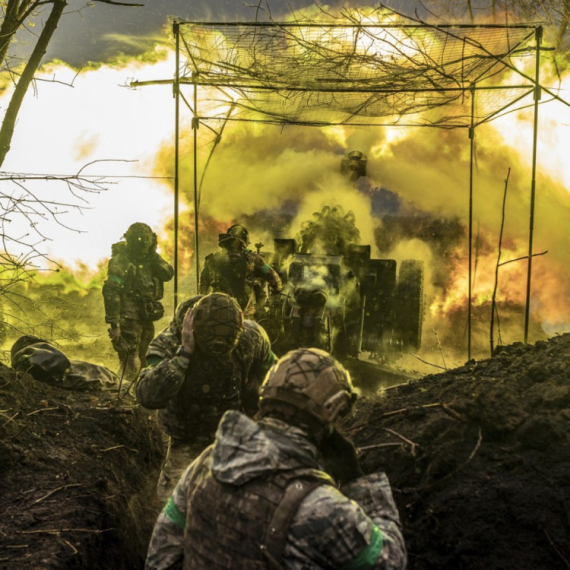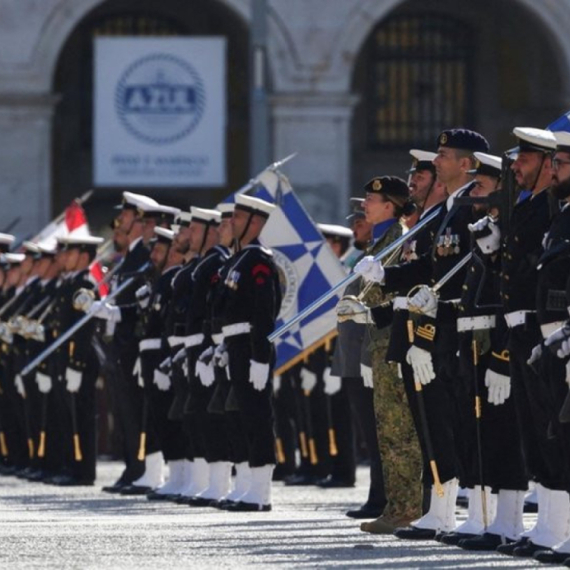Iraqi cabinet approves U.S. military pact
Iraq's cabinet defied opposition from Shiite hardliners on Sunday and approved a timetable for the withdrawal of all U.S. troops by the end of 2011, AFP says.
Sunday, 16.11.2008.
12:17

Iraq's cabinet defied opposition from Shiite hardliners on Sunday and approved a timetable for the withdrawal of all U.S. troops by the end of 2011, AFP says. Baghdad and Washington have been scrambling for months to reach an agreement that will govern the status of more than 150,000 US soldiers stationed in some 400 bases across the country after their UN mandate expires on December 31. Iraqi cabinet approves U.S. military pact The cabinet approved the agreement after a two and a half hour meeting, with 28 ministers out of 38 voting for it, including Prime Minister Nuri al-Maliki, a government official said. Iraq's lead negotiator Muwafaq al-Rubaie told AFP on Friday he believed the draft agreement was a "very good text" and expected it to be approved by parliament as well. "This text will secure the complete, full, irrevocable sovereignty of Iraq," he told AFP. The White House, too, was upbeat on Friday, describing the text of the accord as a "good agreement" that suits both nations. The draft agreement includes 31 articles and calls for U.S. troops to pull out of Iraqi cities by June 2009 and from the entire country by the end of 2011. But the pact has drawn fire from hardline nationalists, especially the anti-American cleric Moqtada al-Sadr, whose supporters have called for mass demonstrations to oppose any agreement with the US "occupier." Iraq has seen dramatic improvements in security over the past year as U.S. and Iraqi forces have allied with local tribal militias to flush insurgents and militias out of vast swathes of the country that were once ungovernable. The reduction in violence has also been partly attributed to an order by Sadr at the end of August 2007 to his thousands-strong Mahdi Army militia to observe a ceasefire. But on Friday Sadr announced the creation of a new militia - the Brigades of the Promised Day - to fight the Americans and demanded that "the occupier leaves our beloved Iraq without any bases and without any accord." As the cabinet meeting began a roadside bomb exploded at a Baghdad checkpoint, killing three people - two of them members of a pro-government Sunni militia - according to police. Another seven people were wounded in the attack, which took place in the capital's northeast Al-Shaab neighbourhood. The objections of the firebrand cleric, who is believed to be living in Iran, will have little impact on the decision, given that his party has only hold 28 seats in Iraq's 275-seat parliament. The agreement will now go to parliament, where it would have to be approved by a majority before Maliki would sign the agreement with U.S. President George W. Bush. The SOFA comprises two sections, security chapters initially drafted by the Americans and the general document, the "strategic framework agreement", put together by the Iraqis. On November 5, the United States gave Iraq its amended version of the pact and stated the negotiations were finished.
Iraqi cabinet approves U.S. military pact
The cabinet approved the agreement after a two and a half hour meeting, with 28 ministers out of 38 voting for it, including Prime Minister Nuri al-Maliki, a government official said.Iraq's lead negotiator Muwafaq al-Rubaie told AFP on Friday he believed the draft agreement was a "very good text" and expected it to be approved by parliament as well.
"This text will secure the complete, full, irrevocable sovereignty of Iraq," he told AFP.
The White House, too, was upbeat on Friday, describing the text of the accord as a "good agreement" that suits both nations.
The draft agreement includes 31 articles and calls for U.S. troops to pull out of Iraqi cities by June 2009 and from the entire country by the end of 2011.
But the pact has drawn fire from hardline nationalists, especially the anti-American cleric Moqtada al-Sadr, whose supporters have called for mass demonstrations to oppose any agreement with the US "occupier."
Iraq has seen dramatic improvements in security over the past year as U.S. and Iraqi forces have allied with local tribal militias to flush insurgents and militias out of vast swathes of the country that were once ungovernable.
The reduction in violence has also been partly attributed to an order by Sadr at the end of August 2007 to his thousands-strong Mahdi Army militia to observe a ceasefire.
But on Friday Sadr announced the creation of a new militia - the Brigades of the Promised Day - to fight the Americans and demanded that "the occupier leaves our beloved Iraq without any bases and without any accord."
As the cabinet meeting began a roadside bomb exploded at a Baghdad checkpoint, killing three people - two of them members of a pro-government Sunni militia - according to police.
Another seven people were wounded in the attack, which took place in the capital's northeast Al-Shaab neighbourhood.
The objections of the firebrand cleric, who is believed to be living in Iran, will have little impact on the decision, given that his party has only hold 28 seats in Iraq's 275-seat parliament.
The agreement will now go to parliament, where it would have to be approved by a majority before Maliki would sign the agreement with U.S. President George W. Bush.
The SOFA comprises two sections, security chapters initially drafted by the Americans and the general document, the "strategic framework agreement", put together by the Iraqis.
On November 5, the United States gave Iraq its amended version of the pact and stated the negotiations were finished.


























Komentari 0